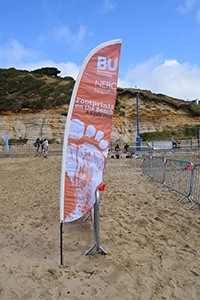 Hundreds of people attended the Footprints on the Beach festival on Bournemouth beach and donated their footprints in the name of science as part of research conducted by Bournemouth University.
Hundreds of people attended the Footprints on the Beach festival on Bournemouth beach and donated their footprints in the name of science as part of research conducted by Bournemouth University.
The Footprints on the Beach Festival collected the prints in the sand near Boscombe Pier with families, passers-by and beachgoers donating their footprints to research conducted by BU academics.
The results will go towards research being led by Professor Matthew Bennett who is currently translating his research on ancient footprints in to tools for forensic science that will help crime scenes investigations in the future. Matthew is an expert in archaeological footprints, and he has worked around the world on ancient footprints. His work has been funded by the Natural Environment Research Council (NERC) who funded this weekend’s festival as part of their 50th birthday celebrations
More than 600 footprints from 200 people were successfully collected over the weekend from locals, passers-by and tourists.
Annette, David and Simi Hellsten, a family from Milford who made the special trip to contribute to science, said, “We heard about the festival on BBC Radio Solent and thought it sounded quite interesting and it’s not very often you get a chance to take part in research.
“The archaeology link sounded interesting and we’ve never heard of people’s footprints in the sand being measured before.”
The footprints of families and children were of particular interest as smaller prints have not been assessed so much in this way before.
Surik Vignaug, an Arts student from London said: “We came to Bournemouth for the weekend and were passing by and we were asked us to take part and we thought it would be fun and it was. It was unexpected and great to do it in such nice weather and on the beach.”
Professor Matthew Bennett and his team reached out to more than 1000 people over the weekend. He said: “The event was a huge success; we brought science to the beach and the public. We also collected valuable data that will help us translate our research into tools of use in forensic practice. Thank you to everyone on the beach over the weekend!” Volunteers will be able to follow their tracks via the website (www.bournemouth.ac.uk/nerc-footprints) to see how their data is used and to stay involved with the research process from data collection to final publication in a few months’ time.
As well as donating footprints, there were number of other activities to do including digging for fossils, science experiments and witnessing an amazing sand sculpture of a T-Rex skull that featured the footprints of some of people who took part.
Rebecca Byng